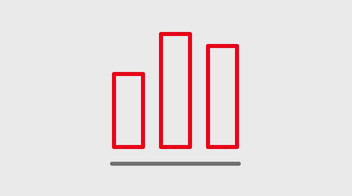ESG risks
Risks in the areas of environment, social and governance can have a significant impact on the net assets, financial position or income situation. ESG risks affect various areas of the risk categories established in DB Group and are recorded and managed by the relevant departments.
ESG factors have become a key factor in competition, both in mode of transport comparisons and within industries such as freight forwarding and logistics. If transformation is too slow, there is a threat of a loss of competitive advantage or competitiveness. Both the Integrated Rail System and DB Schenker are therefore working on extensive transformation programs.
At the same time, a leading role in ESG also offers extensive opportunities for DB Group, such as from the climate-related advantages of rail transport compared to other modes of transport, as anchored in the Strong Rail strategy, or from competitive advantages and growth opportunities that may result from more sustainable logistics solutions.
Environmental management
An elementary component of the Group-wide environmental management system according to DIN ISO 14001 is an opportunity and risk assessment. It is the starting point for DB Group’s environmental risk provisioning. Since 2023, the principle of risk provisioning has been supplemented by the risk management of due diligence obligations along our supply chains. At the same time, our strategy is to use the (natural) resources of our economic activity efficiently (resource conservation targets).
Climate-related opportunities and risks
Climate-related transitory opportunities and risks associated with the transition to a decarbonized economy and risks associated with climate change are recorded in our RMS and are reported in the affected risk categories if certain threshold values and probabilities of occurrence are exceeded. As part of RMS and our mid-term planning, climate risks are treated like other risks.
Through the use of scenario analyses, for example as part of the PIK study and the strategic further development of climate resilience management, DB Group is paving the way for forward-looking management of acute and chronic physical risks related to climate change. In 2021, we commissioned another external study that identified physical and transitory risks in accordance with the TCFD recommendations in an initial impact analysis on the activities of DB Group for two extreme scenarios. The result shows, among other things, that transitory risks from the political, market and technology categories according to the TCFD classification should be classified as relevant for DB Group. In the following section, we list examples of climate-related opportunities and risks in accordance with the TCFD classification of transitory and physical opportunities and risks, which are short-term, medium-term and long-term.
Transitory opportunities and risks
With the green transformation of DB Group, its anchoring in the Strong Rail strategy, and through a shift to climate-friendly rail transport, we are making a central contribution to achieving the German and European climate protection targets. At the same time, however, there is also an increased susceptibility to extreme weather conditions and an increased energy requirement, which in turn represents an energy price and procurement risk for us. Making passenger and freight transport climate-friendly through measures such as the use of renewable energies and alternative drive concepts or through robust climate-resilience management can, for example, enhance our reputation with our customers. Our climate protection measures aim to reduce our greenhouse gas emissions, to see us become climate-neutral by 2040 and to meet the Federal Government’s climate protection target for the transport sector. In order to achieve the national climate protection targets, the Federal Government is adopting necessary regulations. These are often medium-term regulations and hold opportunities for DB Group, especially in rail transport, such as through the permanent reduction of value-added tax for long-distance transport tickets. The introduction of the Germany-Ticket is already showing positive effects on the shift in the mode of transport from the car to the railway. However, individual environmental regulatory measures may also have a negative impact on our activities. The CO₂ price introduced by the Fuel Emissions Trading Act (Brennstoffemissionshandelsgesetz; BEHG) represents, for example, both an opportunity and a risk for us:
- it gives us an opportunity when compared to other means of transport, as it makes fossil-fueled means of transport more expensive and thus rail travel more attractive,
- it presents a risk for our purchasing, as we are one of the largest energy consumers in Germany and still have diesel-powered vehicles in operation.
In order to counteract the risks, we are driving the phase-out of fossil fuels. However, technological developments that lead to other climate-friendly mobility solutions that do not involve rail transport can also represent a risk for us.
Physical risks
Extreme weather events resulting from climate change represent an acute physical risk for DB Group, which we have been recording in more detail in our risk catalog since 2021 and which we are responding to with resilience measures. These risks are both short-term and long-term, because they are short-term when they occur, but due to their more frequent occurrence due to climate change, we must take them into account over the long term. We also address physical climate risks as part of our Group-wide business continuity management to ensure the continuation of critical business processes in the event of damage. The consequences of climate change are impacting our core business. Extreme weather-related damage to our infrastructure can lead to losses in revenues and contractual penalties. It also requires additional expenses and capital expenditures in order to repair damage and implement preventive measures. In addition to the infrastructure, rail and road vehicles can also be affected. In recent years, acute physical risks affecting operations and punctuality have increased significantly. Group Risk Management therefore consistently monitors and records these risks. In this context, the importance of preventive vegetation work and track-related safety work to ensure the smooth running of operations has greatly increased. The potential financial impacts of extreme weather events is taken into account in the RMS or mid-term planning. In order to reduce acute physical risks, DB Group has increased its expenses for vegetation measures, from € 100 million to about € 150 million per year since 2014. We use satellite technology, for example, to record and measure tree populations nationwide. In combination with the expert assessment on-site and the operating conditions, vegetation measures are given priority. This ensures that trees with the highest risk potential are processed first. We also deal with chronic physical risks, such as rising temperatures, which place increased demands on our operational processes, vehicles, buildings and infrastructure.
Human Resources
To implement the Strong Rail strategy, we rely on adequate equipment and qualified, skilled employees. DB Group has a high annual need for new employees. This is reinforced by the age-related retirement of numerous employees as well as the elective model for working hours agreed under collective bargaining agreements.
The collective bargaining negotiations carry risks associated with industrial action measures and unscheduled wage increases.
The shortage of skilled labor, reinforced by demographic change, is a core risk for our business. It is becoming increasingly difficult and time-consuming to fill vacancies with qualified personnel. This in turn results in risks such as low personnel coverage to safeguard ongoing business and the long-term loss of knowledge, especially for railway-specific professions.
We are working to counteract these risks in particular by further developing our employment conditions. This increases the loyalty of our current employees and signals our attractiveness as an employer on a competitive labor market. At the same time, we are continuously working to make the DB Group more powerful: “Strong together” is a Group program which addresses the levers of efficiency and effectiveness (omission, simplification, standardization, automation and digitalization).
Through the further development of our learning infrastructure in the spirit of providing an open, Group-wide learning process, the expansion and digitalization of qualification capacities, the new design of general and functional training (retraining) and measures for strategic succession planning, we ensure sustainable and effective knowledge management and counteract the risk of a loss of knowledge.
The green transformation of DB Group and the expansion of digitalization are critical to the successful implementation of the Strong Rail strategy. To provide the skills, qualifications and specializations that we need in good time and in sufficient quantity and quality is a challenge that we are counteracting through the further development of our strategic workforce management and our foresight approach “Lab1 – professions of the future.” From this, we derive implications for recruitment, hiring and further qualification at an early stage.
One important challenge here is to shape digitalization in close cooperation with employees and stakeholders. Our goal is to offer all employees long-term and sustainable prospects within DB Group.
Appropriate measures for inclusive, cross-generational and inter-cultural cooperation, as well as general conditions for the equalization of participation of all genders, increase our appeal as an employer and reduce risks that may result from changes in employee structure and non-equal participation of employee groups. From recruiting and employment conditions to development opportunities for employees, we follow every step of the employee life cycle to ensure that we adequately address and involve all employee groups. To this end, our diversity management team works closely with all relevant actors in DB Group.
Risks would also arise if we could not respond quickly enough to the changing requirements of a volatile market environment due to inflexible working methods and therefore did not meet the requirements of our employees for a modern working environment. We counter this by driving forward modern working environments as part of numerous programs, initiatives and communities within DB Group.
In order to continue to provide our executives with the appropriate skills and methods to be successful in modern, digitalized working environments, we are constantly developing the training and continuing education program for executives in the DB Academy.
Against the backdrop of economic crises with unclear prospects, the personnel cost structure plays an important role in recruitment. In terms of the labor market and transport market, our target is therefore to always conclude competitive collective bargaining agreements. Strong additional pressure on the development of wages can be expected from the surge in prices. Against this background, we are attempting to conclude collective bargaining agreements in negotiations with the trade unions which, on the one hand, express the appreciation for employees, while at the same time ensuring readiness for the future.


